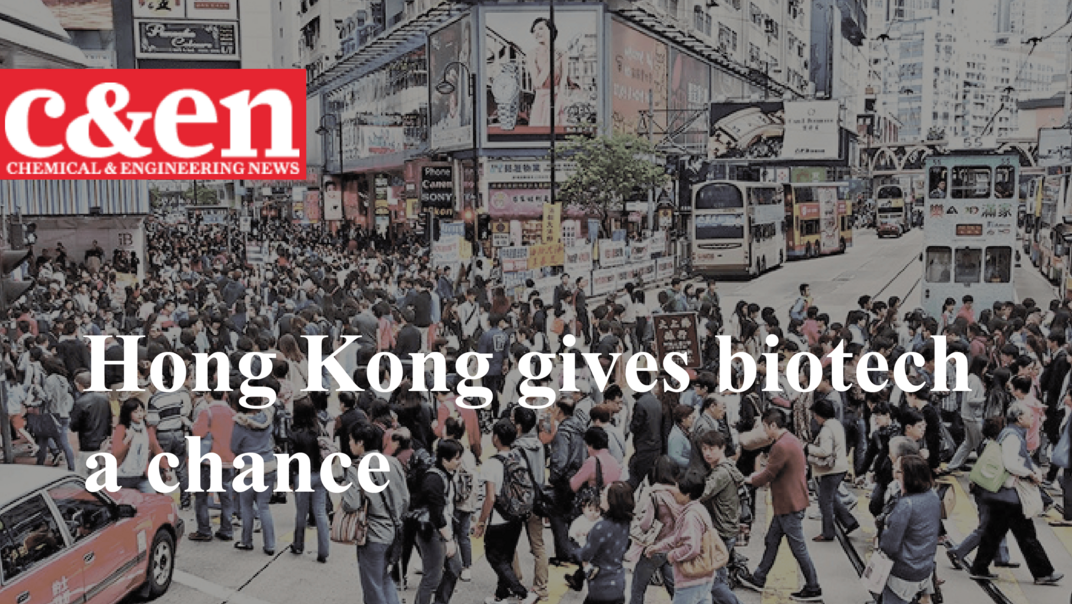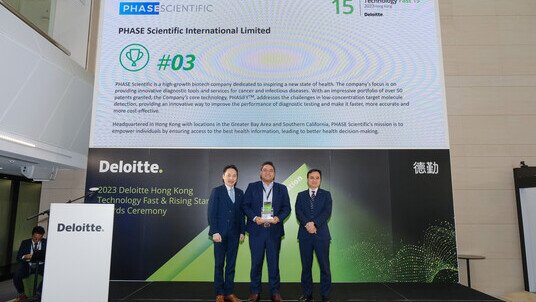Hong Kong Gives Biotech a Chance
NewsJune 1, 2019

When he meets with local bureaucrats and potential investors, Ricky Chiu, CEO of the Hong Kong start-up Phase Scientific, says the question they most often ask is, “When are you going to be profitable?” In California, where he lived for 18 years, investors typically focused on a start-up’s technology and management team. “Here, it’s more practical,” he says.
Before he moved back to Hong Kong last year to head the company he had launched there in 2017, Chiu was well aware that his birthplace was not home to many sophisticated venture capitalists. But he saw something else. The local government’s perennial indifference toward biotech had gone.
“They want success stories,” Chiu says. “A lot of people here will pull together to ensure you are successful.” He wagered that Phase, which manufactures diagnostic kits and provides sample preparation services, stood a good chance in a city better known for finance and shopping.
It wasn’t long ago that Hong Kong offered few career opportunities to graduates of science programs. As the biotech sector flourished to the north in major Chinese cities like Shanghai, little happened in Hong Kong. Like Chiu, many young grads opted to move abroad to pursue their passions.
The environment for biotech started to change about 3 years ago. This followed a few policy changes plus a sharp increase in funding for programs that encourage private R&D. The changes have been enough to lure R&D investment from abroad and encourage the launch of dozens of new start-ups by local entrepreneurs. Suddenly, graduates from science programs at Hong Kong universities can hope to find work locally in their fields.
“Less than 5 years ago, the Science Park had fewer than 20 biomedical companies, and now it’s about 120,” says W. John Kao, head of the biomedical technology cluster at Hong Kong Science and Technology Parks. Established in 2002 at a site adjacent to the Chinese University of Hong Kong in the suburban district of Sha Tin, the park is one of the government’s main initiatives for attracting and developing innovative companies.
“They’re doing diagnostics, Chinese traditional medicines, devices, and pharmaceuticals,” Kao says of the companies in the park. Measures adopted in the past 3 years to encourage the development of high-tech companies have been so successful that the park is running out of space, he adds.
Hong Kong is learning from other science parks around the world how to best harness Hong Kong’s selling points, Kao says. Its decision last year to allow young companies without a commercialized product to list on the exchange has generated much interest in doing R&D in Hong Kong. According to Kao, companies that list in Hong Kong tend to set up labs in the city to increase their appeal to local investors. Overall, in the park, 70% of companies are local and 30% are from China or abroad.
“Everybody wants to come to Hong Kong,” says Yuk Lam Lo, referring to the several Chinese pharmaceutical companies he is on the boards of. Such firms, he says, hope to locate some of their R&D in Hong Kong to get exposure to a more international environment. At the same time, international executives targeting China may “for one reason or other rather operate under Hong Kong laws as well as take advantage of our international schools” to educate their children, he says.
Although it is part of China, Hong Kong still uses the British legal system. And owing to the large number of expatriate professionals already in the city, it features Korean, Japanese, French, US, and other foreign schools.
Often described as the “father of biotechnology” in Hong Kong, Lo has championed the industry for over 20 years. Back when Hong Kong was still a British colony, Lo chaired a committee advising the government on biotechnology policy.
At the time, he was also running the Asian operations of the scientific instrument maker Bio-Rad Laboratories. He is now the chair of GT Healthcare Capital Partners, a $1.5 billion Hong Kong–based private equity fund, and the head of the industry group HK Bio-Med Innotech Association.
It took 2 decades of lobbying just to start changing the mind-set of key government officials and get enough public support to move forward with biotechnology, Lo says. In the 1990s, he recalls, his biotech committee got no more respect than “the chicken farmers committee or the textile committee.”
Lo credits the current Hong Kong government leader, Carrie Lam, for moving the city toward policies supporting science. “She has the support of the central government [in Beijing], and she has made science and technology her top priorities,” Lo says.
In her 2017 policy address, Lam’s annual reading of the Hong Kong government’s priorities, she announced billions of dollars in new funding for science and technology as well as tax credits for companies’ R&D expenses. The government committed itself to subsidizing the salaries of top scientists employed by companies in Hong Kong.
Also that year, the government agreed to start funding the development of the Lok Ma Chau Loop, a piece of riverside land between Hong Kong and Shenzhen, China, that for years was claimed by both cities. Meant to address Hong Kong’s lack of space for high-tech start-ups, the loop will be comanaged by Hong Kong and Shenzhen. Altogether, it will cover over 120 hectares, or more than five times the existing Science Park.
But while the government is now convinced that R&D has a role to play in the Hong Kong economy, the private sector, notwithstanding the recent boom in start-ups, hasn’t yet bought in, Lo laments.
At present, the government accounts for 90% of the money spent on R&D in the city, he says. In contrast, the US private sector accounts for 70% of R&D expenditures, while in Japan and Europe, the proportion is 80%, he says. Lack of private-sector participation is the main drag on the government’s goal of doubling R&D’s contribution to Hong Kong’s economy to 1.5% over the next 5 years, Lo says.
Yet Hong Kong already has the ingredients required for a thriving biotech sector, argues Albert Yu, chair of the Hong Kong Biotechnology Organization, an industry group. The city is home to several universities that rank fairly high in international comparisons, he notes. “We are doing very well in upstream research,” he says.
Yu ticks off other strengths. The city has one of the best intellectual property protection systems in the world, he claims. Hong Kong is also a simple place for foreigners to live in owing to the widespread use of English. And although Hong Kong is handicapped by high costs, companies can locate some of their operations in Chinese cities in the Pearl River Delta, where land and other costs are far lower.
“In Hong Kong, you base your R&D, finance, and legal functions,” he says. Under a trilateral plan commonly called the Greater Bay Area that was launched in 2017, Hong Kong, Macau, and nine Chinese cities around the Pearl River Delta are pursuing economic integration.
Even if it’s playing catch-up to mainland Chinese cities like Shanghai, Hong Kong is destined to become a major biotechnology hub, Yu argues. A key reason is the city’s long exposure to international business practices, he says. “China may have a lot of ‘sea turtles,’ ” he says, referring to foreign-educated Chinese who come home, but they are “not enough” to give rise to a world-class biotech industry. Yu, who himself is a returnee from Canada and the US, shuttles between Hong Kong and Beijing, where he holds positions at Peking University.
The Chinese mainland-born top managers of 3H Health Investment, a private equity firm based in Hong Kong and Shanghai, also see the city as having the right ingredients for success. Wang Shunlong, the company’s chairman, says Hong Kong is an attractive base for conducting biomedical R&D. In particular, Hong Kong is a good location for R&D facilities that customize Western technologies for the Chinese market, he says. A Chinese firm to which 3H licensed a stroke-prevention technology invented in the US will likely set up an R&D center in Hong Kong, he notes.
Although the city is too expensive for manufacturing diagnostics, drugs, and other biotechnology products, Hong Kong’s hospitals are a good place to conduct clinical trials, adds Wang Minchuan, 3H’s managing director. “Hong Kong will be a base for clinical trials executed according to global standards. But the manufacturing will be in China,” he says.
Wang Minchuan and his colleagues believe in the Greater Bay Area vision of Hong Kong collaborating with Chinese cities, each according to its strengths. Increasingly, he notes, Hong Kong is becoming a source of possible investment targets for 3H. “Scientists come back to Hong Kong to do research,” he says. “They have ideas, they’re dynamic, and their technologies are very good.”
Typical of the new companies setting up in Hong Kong is Sanomics, which the young, local entrepreneur Stanley Sy launched in 2015 in the Science Park. Today it employs 40 at four locations. It initially grew by taking advantage of shared lab space that the Science Park provides to qualifying start-ups, Sy says.
Sanomics’s first product is based on research by Tony Mok, a professor at the Chinese University of Hong Kong who is also an investor in Sanomics. His ideas led to the development of a cancer diagnostic service that uses digital polymerase chain reaction technology to test patients’ blood and determine what type of cancer they have.
Sanomics offers the service to doctors throughout Asia. Hong Kong is an excellent location for the business, Sy says, because local doctors are known to be enthusiastic early adopters of new technologies. Moreover, flights between Hong Kong and other Asian cities operate frequently, enabling Sanomics to fly in blood samples from patients in nearby countries. The company couldn’t be located in mainland China because the central government doesn’t allow the import and export of blood samples, Sy notes.
Another university start-up in the Science Park is SkinData Research & Innovation, which is researching the use of polyphenols in skin-care products. Shuting Hu, a cofounder, says the impetus behind SkinData was the research she conducted while pursuing her PhD in biology at the University of Hong Kong. “While I was at HKU, attitudes and policies towards start-ups changed,” she recalls. Whereas universities in Hong Kong used to ban academics from launching spin-offs, it’s now the opposite, Hu says. “My supervisor encouraged me to commercialize my technology.”
The main products that SkinData is developing are polyphenols for creams with skin-whitening properties. In several Asian countries, notably China, women feel that a paler skin tone is more attractive, Hu says.
Hu based her firm in the Science Park because of the inexpensive shared lab space she could get there. At the time, she also looked at lab space in Shenzhen that would have been far more costly because it wouldn’t be shared.
Funding her research, even with cheap lab space, was a challenge, Hu acknowledges. Although Hong Kong is an international finance center, the money available is generally for mergers or companies with products ready for launch, she says. “There’s not so much focus on the early stages, the angel funding.”
But she found money, and now, after a few years of lab work, SkinData is ready to scale up production even though it’s still testing various formulations of its cream. Hu is not sure if Hong Kong is the best place to expand. The Science Park has no shared scale-up lab, so Hu needs space of her own, and Hong Kong is too expensive.
At Pangenia Group, a Hong Kong–based molecular diagnostics company, chair and founder Joseph Tam says local biotechs typically face hurdles when it comes time to expand to a more industrial scale. “The Science Park gives a lot of incentives for the incubation of companies, but what do these start-ups do when they have to move out?” he asks.
Hybribio struggled in Hong Kong. “It nearly went bankrupt three times before we relocated to Chaozhou,” in China, Tam says. The firm is now thriving, he says, and trades on the Shenzhen Stock Exchange. One of the main problems with Hong Kong, he says, is the high cost of industrial space. In Chaozhou, Tam says, local officials sold land to Hybribio cheaply. “They were after the tax income down the line.”
While Tam welcomes the attention that the Hong Kong government is now lavishing on high technology, the city still lacks a comprehensive industrial policy, he says. The government grants land to public housing projects, international schools, and golf courses, Tam says. So why not do the same for the biotech sector?
If Hong Kong had developed an industrial policy decades ago, it wouldn’t find itself chasing mainland China in biotechnology, Tam argues. “I first went to Shanghai in 1979 when we set up a university tie-up with Fudan University,” he says. “Since then, I saw China progress while biotech didn’t take off in Hong Kong.”
However, Tam insists he is optimistic about biotechnology in Hong Kong. After all, DiagCor Bioscience, the core business of Pangenia, is a successful provider of prenatal testing services employing 100 people. Hoping to help create more local success stories, Tam says he frequently invests in Hong Kong start-ups. “I might lose my money, but it’s not important,” he says. “I believe Hong Kong can develop technology.”
One of the companies that Tam invested in is Phase Scientific. Chiu, the founder and CEO, can attest to Tam’s portrayal of Hong Kong as a work in progress when it comes to the biotech industry.
For instance, when Chiu first returned to Hong Kong, he applied for space in the Science Park as an incubating company while simultaneously launching the company elsewhere. “Eighteen months went by, and the park got back to us to say we were past the incubation stage,” he recalls.
Instead, Chiu set up Phase’s R&D center and office in Kwun Tong, a former industrial zone in Hong Kong where new glass towers and aging industrial buildings stand tightly together. Today, Phase also operates a lab in the Science Park to qualify for government funding.
Phase’s core technology is in concentrating test samples to simplify the detection of target molecules. Whereas most firms focus on the sensitivity of molecule-finding sensors, Phase’s approach is to modify the samples, he says.
To generate cash, the company offers a sample preparation service that helps local labs increase the sensitivity of liquid biopsies conducted during late-stage cancer screening. Phase reinvests the margins in longer-term research, such as the development of home-use diagnostic kits for hepatitis, malaria, or sexually transmitted diseases. The firm already has a kit on the market that detects the risk of tooth cavities; it was developed in Hong Kong but is made in the US.
A challenge for biotech firms in Hong Kong, Chiu says, is the lack of familiarity with the industry that he keeps encountering in government, the financial community, and even academia. “The universities want to work with us—we offer internships and jobs—but they have no tradition of working with start-ups.” That shortcoming is offset by Hong Kong’s location next to mainland China, high valuations by local investors, and the government’s determination to see biotech succeed.
Altogether, Chiu says, “I have the opportunity here to capture something that would not be available in California.”
News Source: c&en
Hong Kong gives biotech a chance (acs.org)



